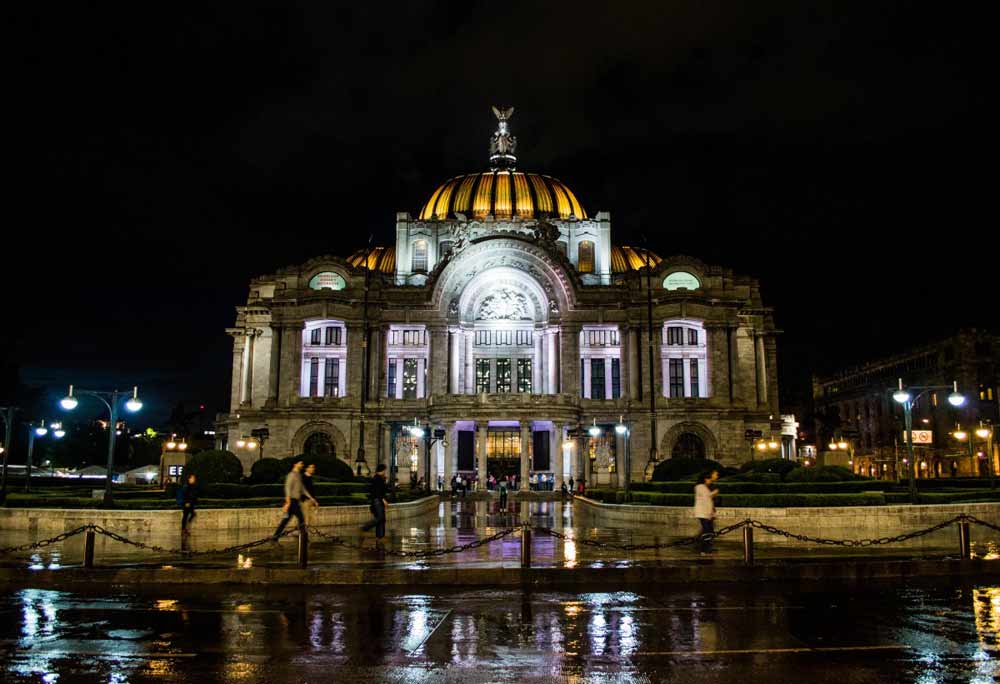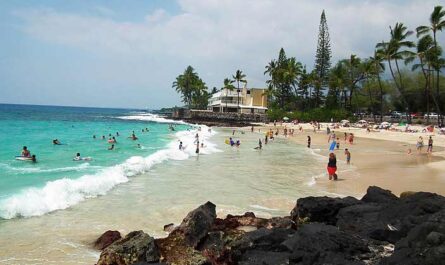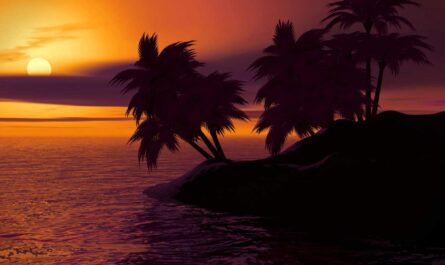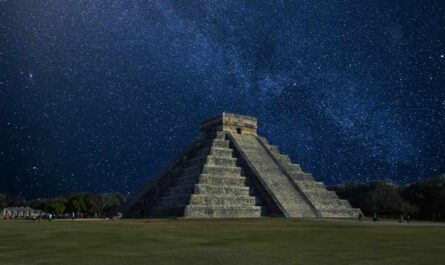What are some of the interesting facts about Puebla, Mexico? Nestled in the heart of Mexico, Puebla stands as a vibrant testament to the country’s rich cultural heritage and colonial history. Located in the central part of Mexico, approximately 70 miles southeast of Mexico City, this picturesque city boasts a captivating blend of Spanish colonial architecture, indigenous traditions, and modern Mexican culture. Puebla, often referred to as “Puebla de los Ángeles” (City of Angels), is renowned for its well-preserved historic center, which was designated a UNESCO World Heritage Site in 1987. Visitors are enchanted by the city’s stunning cathedrals, colorful facades, and lively markets offering an array of culinary delights. In this article, I am going to talk about some interesting facts about Puebla, Mexico.
Cool, Interesting, Fun Facts about Puebla, Mexico
Beyond its architectural splendors, Puebla is also celebrated for its rich culinary scene, particularly its famous dish, mole poblano, and vibrant festivals that showcase the region’s folklore and traditions. With its welcoming atmosphere and rich tapestry of cultural experiences, Puebla invites travelers to immerse themselves in the essence of Mexico. Here are some interesting facts about Puebla, Mexico:
1. Enchanting Location of Valley City
Valley City, located within the picturesque Valley of Puebla in Mexico, is embraced by the natural splendor of its surroundings. Surrounded by four towering volcanoes, the city is graced with a stunning backdrop that enhances its scenic beauty and contributes to the fertility of its lands. This idyllic setting creates a sense of tranquility and charm, facts about Puebla, Mexico making Valley City a captivating destination for residents and visitors alike.
2. Comfortable Climate of Valley City
The climate of Valley City is characterized by its mild and inviting nature, offering pleasant conditions throughout the year. With warm days and refreshingly cool nights, the city provides an ideal environment for engaging in outdoor pursuits and leisure activities. Whether exploring the city’s parks, strolling along its charming streets, or simply enjoying al fresco dining, residents and visitors can relish in the comfortable climate that Valley City has to offer.
3. Majestic Volcanic Presence
Standing tall and proud against the cityscape, the majestic peaks of Popocatépetl and Iztaccíhuatl volcanoes command attention and admiration. These awe-inspiring natural landmarks dominate the skyline of Valley City, serving as iconic symbols of the region’s geological heritage. Offering breathtaking views and a sense of grandeur, these volcanic peaks add to the allure and character of Valley City, captivating the imagination of all who behold them.
4. Abundant Wildlife and Flora
The surrounding areas of Puebla boast a rich biodiversity, teeming with a diverse array of wildlife and plant life. From majestic birds such as eagles soaring through the skies to the delicate flutter of hummingbirds among vibrant flowers, fun facts about Puebla, Mexico the region is a haven for nature enthusiasts. The lush landscapes are adorned with a tapestry of flora, ranging from towering trees to colorful blooms, creating a harmonious ecosystem that supports a variety of species.
5. Cuexcomate: The Remarkable Clay Pot Volcano
Puebla lays claim to a remarkable geological wonder known as Cuexcomate, the world’s smallest volcano. This unique formation stands as a testament to the region’s intriguing geological history and serves as a point of fascination for both locals and visitors alike. Despite its diminutive size, Cuexcomate’s presence looms large, offering a glimpse into the Earth’s natural processes and igniting curiosity about the forces that shape our planet.
6. The Enduring Legacy of the “City of Angels”
Puebla, known as Puebla de los Ángeles (City of Angels) in its early colonial days, holds a rich heritage steeped in history and tradition. The city’s original name reflects its profound connection to its colonial roots and the influence of Spanish settlers who bestowed upon it this celestial moniker. Today, Puebla’s nickname serves as a reminder of its storied past and enduring legacy, evoking a sense of enchantment and wonder for those who walk its streets.
7. UNESCO World Heritage Site: Preserving Colonial Splendor
The historic center of Puebla stands as a testament to its rich colonial heritage and architectural magnificence. Recognized as a UNESCO World Heritage Site, this area showcases the city’s cultural significance and the enduring legacy of its colonial past. From its ornate churches and majestic cathedrals to its grand plazas and opulent palaces, the historic center of Puebla invites visitors to immerse themselves in its timeless charm and unparalleled beauty.
8. Commemorating the Battle of Cinco de Mayo
Puebla holds a significant place in Mexican history as the site of the Battle of Cinco de Mayo, a pivotal moment in the nation’s struggle for independence. On May 5, 1862, Mexican forces achieved a remarkable victory over the French army, defying the odds and inspiring a sense of national pride and unity. Today, amazing facts about Puebla, Mexico the Battle of Cinco de Mayo is commemorated annually, serving as a symbol of resilience and determination in the face of adversity.
9. Cultural Fusion: Indigenous and European Influences
Puebla’s vibrant culture is a reflection of its diverse heritage, blending indigenous traditions with European influences to create a unique and dynamic tapestry of customs, cuisine, and art. From its colorful festivals and traditional dances to its mouthwatering cuisine and intricate handicrafts, Puebla’s cultural identity is a celebration of diversity and inclusivity. Visitors to the city can experience this rich cultural fusion firsthand, exploring its bustling markets, savoring its flavorful dishes, and marveling at its artistic masterpieces.
10. Vibrant Festivals: Celebrating Culture and Cuisine
Puebla pulsates with energy throughout the year as it hosts a myriad of vibrant festivals that showcase its rich cultural heritage and gastronomic delights. From the aromatic spices of the Mole Poblano Festival to the tantalizing flavors of the Festival of Chiles en Nogada, each celebration offers a unique opportunity to immerse oneself in the sights, sounds, and tastes of Puebla’s vibrant traditions. Whether it’s the rhythmic beats of traditional music or the kaleidoscope of colors adorning the streets, these festivals bring the community together in a joyful celebration of culture and cuisine.
11. Mole Poblano: A Culinary Masterpiece
At the heart of Puebla’s culinary heritage lies the iconic dish known as Mole Poblano, a testament to the city’s culinary creativity and cultural fusion. This rich and complex sauce, crafted from a harmonious blend of chilies, chocolate, spices, and other ingredients, is revered as Puebla’s signature culinary creation. With its deep, velvety texture and nuanced flavors, Mole Poblano delights the palate and captivates the senses, earning its place as a beloved symbol of Puebla’s gastronomic excellence.
12. Cemitas: A Taste of Tradition
For a taste of Puebla’s vibrant street food scene, look no further than the beloved Cemitas. These savory sandwiches served on sesame seed buns, are filled with a tantalizing array of ingredients, including tender meats, creamy cheeses, crisp vegetables, and zesty sauces. Whether enjoyed as a quick snack or a hearty meal, Cemitas offers a delicious glimpse into Puebla’s culinary heritage and cultural diversity. With each bite, diners embark on a flavorful journey through the streets of Puebla, savoring the authentic flavors and aromas of this beloved local delicacy.
13. Candy Capital: Sweet Delights of Puebla
Dubbed the “Candy Capital” of Mexico, Puebla has earned its reputation for producing exquisite handcrafted candies that delight the senses and tantalize the taste buds. For centuries, artisans in Puebla have perfected the art of candy-making, crafting intricate confections that are as beautiful as they are delicious. From colorful sugar skulls to delicate marzipan fruits, Puebla’s candies are cherished treasures that reflect the city’s rich cultural heritage and culinary creativity.
14. Foodie Paradise: A Culinary Adventure Awaits
Beyond its traditional dishes, Puebla beckons food enthusiasts with a diverse culinary landscape that offers something for every palate. From elegant international cuisines to inventive local eateries, interesting facts about Puebla, Mexico Puebla’s dining scene is a paradise for food lovers seeking new and exciting flavors. Whether you’re craving classic Mexican fare or eager to sample innovative fusion dishes, Puebla’s culinary scene promises an unforgettable gastronomic adventure that celebrates the city’s culinary diversity and culinary innovation.
15. Local Markets: A Feast for the Senses
Step into the bustling markets of Puebla, such as El Parián, and immerse yourself in a world of sights, smells, and flavors that capture the essence of the city’s vibrant food culture. Here, amidst the lively bustle of vendors and shoppers, you’ll discover a treasure trove of local delicacies, from freshly prepared street food to artisanal crafts and traditional treats. Take your taste buds on a journey through Puebla’s culinary heritage as you sample the diverse array of flavors and aromas that define this enchanting city’s food scene.
16. Talavera Tiles: Artistry in Clay
Puebla’s streets and structures are adorned with the vibrant hues of Talavera pottery, a testament to the city’s rich artistic heritage. These handcrafted tiles, adorned with intricate patterns and bold colors, lend a distinctive charm to Puebla’s architecture, from humble homes to majestic churches. Each piece of Talavera pottery tells a story of centuries-old craftsmanship and cultural pride, making Puebla a renowned destination for admirers of fine ceramic art.
17. Cathedral Majesty: A Baroque Marvel
Dominating the city’s skyline, the Puebla Cathedral stands as a testament to the grandeur of Baroque architecture. Its majestic facade, adorned with intricate carvings and ornate sculptures, captivates visitors with its timeless beauty. The towering bell towers, reaching towards the heavens, symbolize the city’s enduring faith and spiritual heritage. Step inside this architectural marvel to marvel at its soaring ceilings, intricate altarpieces, and serene sanctuaries, where the echoes of centuries past mingle with the whispers of prayer.
18. Chapel of the Rosary: A Gilded Sanctuary
Nestled within the Santo Domingo Church, the Chapel of the Rosary is a dazzling display of colonial artistry and religious devotion. Adorned with lavish gold leaf decorations and intricate frescoes, this breathtaking chapel transports visitors to a realm of celestial splendor. Every surface is meticulously adorned with intricate carvings and embellishments, creating a sanctuary of unparalleled beauty and reverence. As sunlight filters through stained glass windows, illuminating the golden hues of the chapel, visitors are invited to bask in the divine radiance of this sacred space.
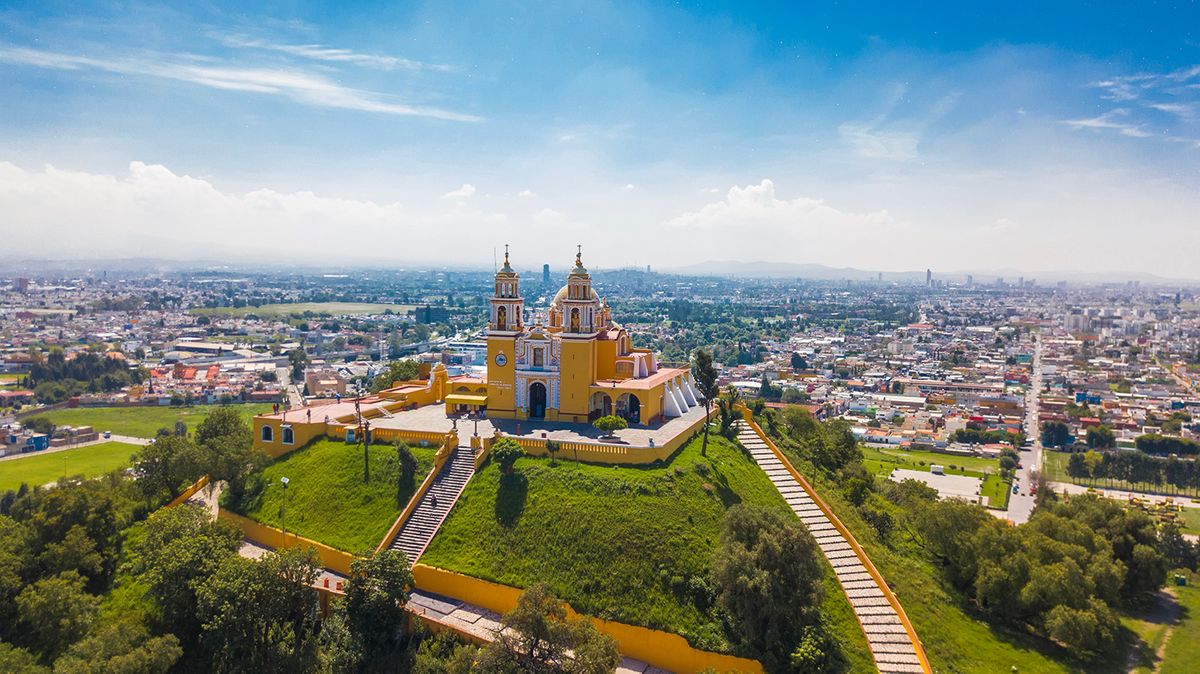
19. Fort Loreto: Sentinel of History
Perched atop a strategic vantage point, Fort Loreto stands as a silent sentinel overlooking the city of Puebla. With its storied past and commanding presence, this historic fort offers visitors a glimpse into the city’s tumultuous history and military heritage. From its ramparts, one can behold panoramic views of Puebla’s sprawling landscape, a testament to the fort’s strategic significance throughout the centuries. As visitors wander through its time-worn corridors and battlements, they are transported back in time to an era of conquests, conflicts, and conquests, forging a deeper connection to Puebla’s rich historical tapestry.
20. Amparo Museum: Treasures of the Past
Nestled within the heart of Puebla, the Amparo Museum is a treasure trove of pre-Hispanic artifacts and colonial art, offering visitors a captivating journey through the city’s cultural heritage. From ancient relics to priceless artworks, the museum’s exhibits provide a window into Puebla’s storied past, and awesome facts about Puebla, Mexico illuminating the diverse influences that have shaped its identity. As visitors wander through its halls, they are immersed in the vibrant tapestry of Puebla’s history, where the echoes of bygone eras resonate with the present, fostering a deeper appreciation for the city’s cultural legacy.
21. Friendly and Welcoming: Hospitality in Puebla
Puebla’s charm extends beyond its architectural wonders and cultural attractions; it lies in the warmth and hospitality of its people. Known for their genuine friendliness and welcoming demeanor, the residents of Puebla make visitors feel right at home from the moment they arrive. Whether sharing a meal at a local eatery, exploring the city’s bustling markets, or simply strolling through its charming streets, visitors are greeted with open arms and warm smiles at every turn. In Puebla, hospitality is not just a gesture but a way of life, enriching the travel experience and leaving a lasting impression on all who visit.
22. Family-Oriented Culture: Bonds of Tradition
In Puebla, family is the cornerstone of society, and familial bonds run deep within its cultural fabric. From joyous celebrations to solemn rituals, family life is cherished and celebrated, fostering a sense of unity and belonging among its residents. Traditions passed down through generations form the bedrock of Puebla’s identity, shaping its customs, values, and way of life. Whether gathering for festive occasions or lending a helping hand in times of need, families in Puebla embody the spirit of kinship and solidarity, nurturing a strong sense of community and belonging that defines the city’s cultural landscape. How AI, ChatGPT maximizes earnings of many people in minutes
23. Rich Street Life: The Heartbeat of Puebla
Step onto the streets of Puebla, and you’ll be greeted by a symphony of sights, sounds, and colors that pulse with life. From bustling markets teeming with vendors hawking their wares to vibrant street performers captivating passersby with their talents, the city’s streets are alive with activity. Wander through the historic center, where centuries-old buildings stand as silent witnesses to Puebla’s storied past, and vibrant facts about Puebla, Mexico, or immerse yourself in the lively atmosphere of the zócalo, where locals and visitors alike gather to socialize and soak in the city’s vibrant energy. In Puebla, every street corner tells a story, inviting you to experience the rich tapestry of life that thrives within its bustling thoroughfares.
24. Unique Slang: The Language of Puebla
In Puebla, language is more than just a means of communication; it’s a reflection of the city’s distinct identity and culture. The Poblano accent and local slang add a touch of personality to everyday conversations, infusing them with charm and character. From colorful idioms to playful expressions, Puebla’s unique linguistic quirks are a source of pride for its residents, serving as a cultural marker that sets the city apart. Whether engaging in casual banter with locals or navigating the intricacies of everyday life, visitors to Puebla are sure to encounter the city’s rich linguistic heritage, adding an extra layer of depth to their cultural experience. Motivation – Mind – Success – Thinking – Productivity – Happiness
25. Affordable Living: A City Within Reach
For those seeking an affordable yet vibrant urban experience, Puebla offers an enticing blend of affordability and quality of life. Compared to other major Mexican cities, Puebla boasts a relatively low cost of living, making it an attractive destination for expats, students, and budget-conscious travelers alike. From affordable housing options to reasonably priced dining and entertainment, Puebla provides ample opportunities to live comfortably without breaking the bank. Whether you’re a student embarking on a new academic journey or a retiree seeking a peaceful yet vibrant retirement destination, Puebla welcomes you with open arms and affordable living options that make it a city within reach.
26. Manufacturing Hub: Driving Puebla’s Economy
Puebla’s status as a significant manufacturing center is underscored by its thriving automotive industry, which has positioned the city as a key player in Mexico’s industrial landscape. With a robust infrastructure and strategic location, Puebla serves as a hub for automotive production, attracting major manufacturers and contributing significantly to the region’s economic growth. From assembly plants to component suppliers, the automotive sector in Puebla provides employment opportunities and drives innovation, cementing the city’s reputation as a powerhouse in manufacturing. Business – Money Making – Marketing – E-commerce
27. Tech Growth: Fostering Innovation in Puebla
In recent years, Puebla has emerged as a hotspot for technological innovation, experiencing rapid growth in the tech sector. The city’s dynamic ecosystem has become a magnet for startups and tech companies seeking to capitalize on Puebla’s entrepreneurial spirit and supportive business environment. With a focus on innovation and collaboration, Puebla’s tech scene is thriving, fueling economic diversification and driving forward-thinking initiatives that harness the power of technology to address societal challenges and drive progress. Health books, guides, exercises, habits, Diets, and more
28. University City: Nurturing Academic Excellence
Puebla’s reputation as a center of learning is further bolstered by its prestigious universities, including the esteemed Benemérita Universidad Autónoma de Puebla (BUAP). As a vibrant university city, Puebla boasts a rich academic environment that fosters intellectual curiosity, creativity, and innovation. With world-class faculty, state-of-the-art facilities, and a diverse range of academic programs, BUAP and other universities in Puebla attract students from across Mexico and around the globe, jaw-dropping facts about Puebla, Mexico contributing to the city’s cultural diversity and intellectual vitality. As a bastion of knowledge and learning, Puebla’s universities play a pivotal role in shaping the future leaders and innovators of tomorrow. Fitness – Meditation – Diet – Weight Loss – Healthy Living – Yoga
29. Entrepreneurial Spirit: Fostering Innovation and Enterprise
In Puebla, the spirit of entrepreneurship thrives, with a supportive ecosystem that nurtures innovation and creativity. The city is home to a vibrant community of entrepreneurs, driven by a desire to turn their ideas into reality and make a positive impact on society. Initiatives and programs aimed at supporting small businesses and startups abound, providing aspiring entrepreneurs with the resources, mentorship, and networking opportunities they need to succeed. Whether launching a tech startup, a culinary venture, or a boutique business, Puebla offers a fertile ground for entrepreneurial endeavors to take root and flourish. With a culture that celebrates innovation and enterprise, Puebla is paving the way for the next generation of trailblazers and changemakers. RPM 3.0 – 60% CONVERSION & Money for Affiliate Marketing
30. Safe City: A Haven of Security and Serenity
Safety is a top priority in Puebla, where residents and visitors alike enjoy a sense of security and peace of mind. The city’s commitment to maintaining law and order is evident in its well-equipped police force, efficient emergency response systems, and proactive crime prevention measures. Tourists can explore Puebla’s charming streets and bustling markets without fear, while residents go about their daily lives with confidence and tranquility. From its historic landmarks to its vibrant neighborhoods, charming facts about Puebla, Mexico, which is a city where safety and serenity go hand in hand, offering a welcoming environment for all who call it home or visit its shores.
More Interesting Articles
- 100 Cool Facts about Japan for Curious Learners
- 100 Interesting Facts About China to Know About
- 100 Venice, Italy Facts – Fun Facts about Venice
- 100 Top Interesting, Evergreen Facts about Nepal
- Largest Banks in the World – Big Banks with Reputation
- Top 100 Medical Colleges in the World
- The List of World Top 100 Universities
- 40 Interesting Facts about Beautiful Pokhara, Nepal
- List of Current United States Senators of the Congress
- The States in Alphabetical Order – Names of States in the USA
- 60 Interesting Facts About Morocco for Beginners
- 100 Top Interesting Facts About South Korea for Beginners
- 50 Interesting Cape Town South Africa Facts
- 30 Amazing Tokyo Tower Fun Facts for Learners
- 60 Fun Facts about Barcelona for Curious Minds
- 100 Interesting Facts About Rome for Avid Learners
- 100 Top Interesting Facts about Ghana for Everyone
- 20 Interesting Facts About Bandung, Indonesia
- 23 Interesting Facts About Nagoya Japan
- 18 Facts About National Palace Museum, Taiwan
